Oaxaca Civil Protection warns residents of scammers impersonating agency officials in public spaces, urging vigilance and official reporting . . .


Oaxaca Civil Protection warns residents of scammers impersonating agency officials in public spaces, urging vigilance and official reporting . . .
